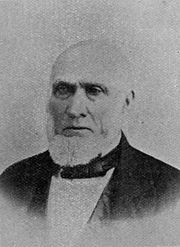
Joseph W. Brown
Encyclopedia

Jacob Brown
Jacob Jennings Brown was an American army officer in the War of 1812. His successes on the northern border during that war made him a hero. In 1821 he was appointed commanding general of the U.S. Army and held that post until his death.-Early life:Born in Bucks County, Pennsylvania, Jacob Jennings...
, the founder of Brownville, New York
Brownville, New York
Brownvile, New York may refer to:*Brownville , New York*Brownville , New York...
. General Brown (and wife Cornelia), along with his brother-in-law Musgrove Evans (and wife Abi), their cousin Austin Wing and a dozen or so pioneers founded the town of Tecumseh, Michigan
Tecumseh, Michigan
Tecumseh is a small city in Lenawee County of the U.S. state of Michigan. It is situated where M-50 crosses the River Raisin, a few miles east of M-52. Tecumseh is about SW of Detroit, south of Ann Arbor and north of Toledo, OH....
in 1824. General Joseph Brown died in 1880 at his daughter’s home in Toledo, Ohio
Toledo, Ohio
Toledo is the fourth most populous city in the U.S. state of Ohio and is the county seat of Lucas County. Toledo is in northwest Ohio, on the western end of Lake Erie, and borders the State of Michigan...
.
From Tecumseh, General Brown ran a stage coach line which operated under the Western Stage Company and ran from Detroit through Ypsilanti, Saline, Tecumseh, Jonesville, White Pigeon, Niles, and Michigan City ending in Chicago – a total trip of just 4½ days (which frequently took six).
The route of Brown’s stage line between Saline and Jonesville – stopping in Tecumseh – was anything but the most direct. However, it required that the passengers have an overnight stay in Tecumseh where Brown also owned and operated a large Inn called the Peninsular House.
General Brown was involved in the Toledo War
Toledo War
The Toledo War , also known as the Michigan-Ohio War, was the almost entirely bloodless boundary dispute between the U.S. state of Ohio and the adjoining territory of Michigan....
, having been appointed to protect the disputed area between Ohio and Michigan by then Michigan Governor Stevens T. Mason
Stevens T. Mason
Stevens Thomson Mason , also known as Stevens T. Mason, Tom Mason, The Boy Governor, and lesser known nicknames Young Hotspur and The Stripling, was the territorial governor of the Michigan Territory, and later the first Governor of the state of Michigan. Mason guided the Michigan Territory into...
. In the spring of 1835 the tensions between Ohio and Michigan escalated when it was reported to that a survey party had encroached on Michigan territory and was camped south of Adrian at Phillips Corners. On April 26, 1835 Deputy Sheriff, Colonel William McNair of Tecumseh led a party to intercept the survey group from Ohio. General Brown went along with the essentially civilian group as “special agent of the Territory to watch the Ohio situation” his official title per gubernatorial appointment.
Shots were fired but it was never clear if they were directed at the Ohio group or if they were for effect to flush them out of the cabins in which they were spending their Sabbath. Some Ohio “invaders” escaped while about a dozen were captured. These were escorted back to Adrian where all but one were released. Engineer, Colonel Fletcher, was retained to “test the validity of the arrest.” Colonel Fletcher spent some months in custody in Tecumseh. Benjamin Baxter’s account of the events, found in Clara Waldron’s One Hundred Years – A Country Town, states that Fletcher was:
"a genial gentleman not suffering apparently from his term of incarceration, but sometimes subjecting us to the inconvenience of hunting him up when we had occasion to use the jail for some counterfeiter or horse thief, as he was likely to be found out riding with one of the sheriff’s lovely daughters, having taken the jail keys with him."
Later in 1835 General Brown would lead a large group of soldiers to Toledo to protect the rights of the Territory of Michigan. In his memoirs, also quoted in Clara Waldron’s book, Dr. M. A. Patterson says of Brown:
“As a commander of the Michigan forces in the Black Hawk War, he had acquitted himself to the entire satisfaction of the territorial and national authorities. As commander of the Toledo expedition, he performed his duties equally well and secured all that was desired of the expedition, which was to prevent the Executive of Ohio from trampling upon the rights of the people of Michigan.”
It is suggested that General Brown’s "moderation and good sense helped prevent possible bloodshed."

